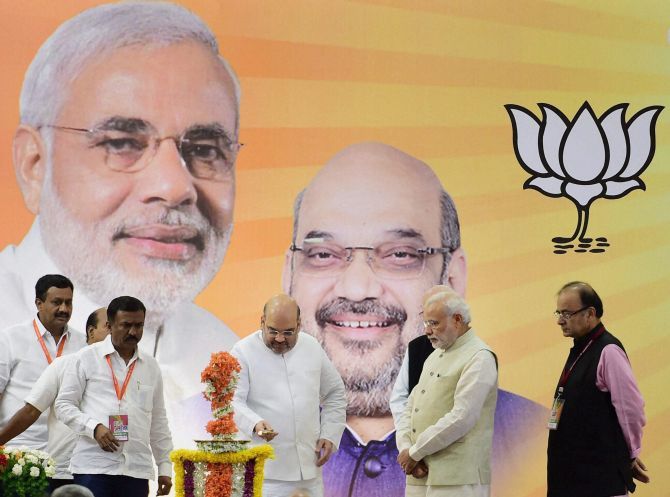While PM Narendra Modi-Amit Shah dominated the national executive, senior chief ministers and ‘margdarshaks’ LK Advani, Murli Manohar Joshi were ignored

The Bharatiya Janata Party’s recently concluded national executive meeting was marked by many firsts. The foremost being how voices of Prime Minister Narendra Modi and party President Amit Shah dominated those of all others, including senior party leaders L K Advani and Murli Manohar Joshi and state BJP chief ministers of the standing of Madhya Pradesh’s Shivraj Singh Chouhan, Raman Singh of Chhattisgarh and Rajasthan’s Vasundhara Raje.
Advani refused to speak during the meeting held on Friday and Saturday in Bengaluru. He was reportedly upset at not being consulted about the agenda of the meeting. Party sources claimed both Modi and Shah reached out to him. Forty eight hours later, Advani wasn’t even invited for the BJP’s 35th foundation day celebrations in New Delhi on Monday, a gesture that betrayed how feeble those outreach attempts must have been.
The PM did acknowledge in his valedictory speech in Bengaluru the “margdarshan” or guidance he gets from a “group” of senior party leaders, but neither mentioned Advani nor Joshi by name. This was the first time that Advani hadn’t addressed the national executive since the BJP was founded in 1980, barring the 2013 meeting in Goa that elected Modi as the head of the party’s election campaign committee for the Lok Sabha elections. Advani had skipped that meeting.
Some of the newly elected or appointed chief ministers -- Jharkhand’s Raghubar Das, Devendra Fadnavis of Maharashtra, Haryana’s Manohar Lal Khattar, Goa’s Laxmikant Parsekar and Jammu and Kashmir Deputy CM Nirmal Singh -- were felicitated. But that was the only time delegates got to see them on stage, while others like Raje, Chouhan and Singh were largely inconspicuous during the two-day deliberations.
Home Minister Rajnath Singh, the number two in the Modi government, presented a political resolution that enumerated BJP’s assembly election triumphs and details of its victories in various civic polls in Rajasthan and Assam.
But the resolution glossed over the embarrassing defeat the party suffered in Delhi assembly polls, with party leaders stating that the Delhi unit was analysing the reasons for that loss. It was senior party leaders led by Shah, and not the Delhi unit, that had taken most of the decisions to do with the Delhi polls, including that of projecting former top police officer Kiran Bedi as the chief ministerial candidate.
The resolution on foreign policy, moved by General Secretary Ram Madhav, and seconded by External Affairs Minister Sushma Swaraj, was again self-congratulatory but with little on the Modi government’s flip-flop on relations with Pakistan. In another first, the national executive didn’t have an economic resolution.
Instead, the meeting had two presentations -- one by Madhav on the BJP’s alliance government with the People’s Democratic Party and another by Gopal Agarwal on the Land bill.
In their speeches and interventions, Modi and Finance Minister Arun Jaitley insisted the contentious land ordinance to be pro-farmer. According to sources, there was not a dissenting voice within the party, not even within the larger Sangh Parivar for that matter, on the way the Modi government pushed through its land ordinance.
There were some other firsts, too. According to the BJP constitution, the national executive should meet every three months. But this national executive was meeting after a year. The BJP president had reconstituted the executive last month. The party constitution mandates that 40 of the executive’s 120 members, that is one-third, should be women. Of the 111-members, only eight in the executive are women. In another first, the PM addressed a public rally on the first day of the meeting. It usually takes place on the last day of the executive.
An old timer, who didn’t want to be quoted, reminisced how such unity of purpose and voices between the party and the government was rarely seen during national executive meetings that took place when Atal Bihari Vajpayee was the prime minister.
The national executive of 1999, when the Vajpayee-led National Democratic Alliance government at the Centre, was remarkable for then party president Kushabhau Thakeray moving a resolution criticising the economic reforms of the government, while Madan Lal Khurana, a Union minister in the Vajpayee cabinet, moved a resolution that ostensibly targeted the Sangh Parivar by talking of minority rights and noted with trepidation the increase in attacks on Christians. A fortnight later, Khurana, under pressure from the Sangh Parivar, had to quit the Union Cabinet despite Vajpayee backing him.
In his address to party office bearers on Thursday, Prime Minister Modi praised Shah for the successful membership drive. Shah, according to Union Minister Prakash Javadekar, said in his inaugural address at the executive the Modi government at the Centre could last for a “15-20 years”.
Shah said in his speech what marked out the BJP from 1,500 other political parties in India was the strength of its inner democracy. While Modi, as if taking a cue from the Congress, implored party workers to work for “the poor, the Dalits and the deprived”.
According to an out-of-favour BJP old timer, there have been times in Indian politics when the party seemed totally subsumed within the government. “It happened in the Congress after Sardar Patel passed away and Purshottamdas Tandon and others were marginalised by Jawaharlal Nehru in the early 1950s.
It repeated itself in the 1970s when Indira Gandhi, having survived the challenge by the Congress Syndicate, managed to have favourable party presidents,” he said. Assam politician D K Barooah was the Congress chief during the Emergency years of 1975 to 77, and had famously said: “India is Indira. Indira is India.”



.jpg)








 © 2025
© 2025